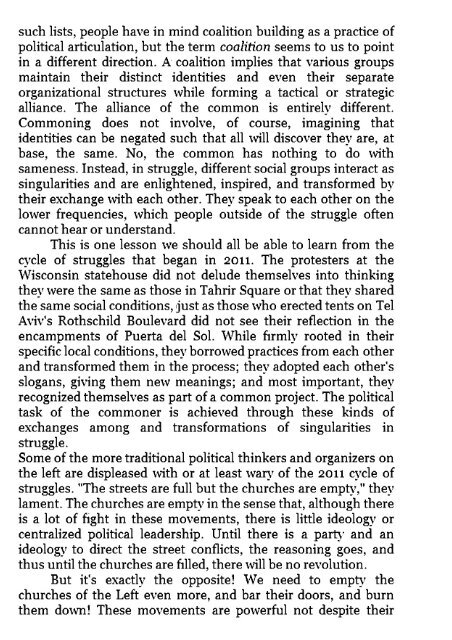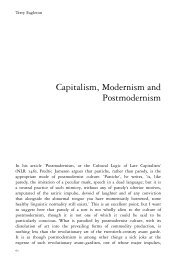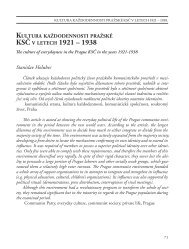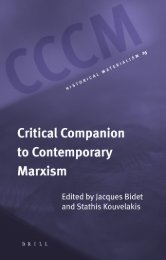Chapter 1: Subjective Figures of the Crisis ... - Negri in English
Chapter 1: Subjective Figures of the Crisis ... - Negri in English
Chapter 1: Subjective Figures of the Crisis ... - Negri in English
Create successful ePaper yourself
Turn your PDF publications into a flip-book with our unique Google optimized e-Paper software.
such lists, people have <strong>in</strong> m<strong>in</strong>d coalition build<strong>in</strong>g as a practice <strong>of</strong><br />
political articulation, but <strong>the</strong> term coalition seems to us to po<strong>in</strong>t<br />
<strong>in</strong> a different direction. A coalition implies that various groups<br />
ma<strong>in</strong>ta<strong>in</strong> <strong>the</strong>ir dist<strong>in</strong>ct identities and even <strong>the</strong>ir separate<br />
organizational structures while form<strong>in</strong>g a tactical or strategic<br />
alliance. The alliance <strong>of</strong> <strong>the</strong> common is entirely different.<br />
Common<strong>in</strong>g does not <strong>in</strong>volve, <strong>of</strong> course, imag<strong>in</strong><strong>in</strong>g that<br />
identities can be negated such that all will discover <strong>the</strong>y are, at<br />
base, <strong>the</strong> same. No, <strong>the</strong> common has noth<strong>in</strong>g to do with<br />
sameness. Instead, <strong>in</strong> struggle, different social groups <strong>in</strong>teract as<br />
s<strong>in</strong>gularities and are enlightened, <strong>in</strong>spired, and transformed by<br />
<strong>the</strong>ir exchange with each o<strong>the</strong>r. They speak to each o<strong>the</strong>r on <strong>the</strong><br />
lower frequencies, which people outside <strong>of</strong> <strong>the</strong> struggle <strong>of</strong>ten<br />
cannot hear or understand.<br />
This is one lesson we should all be able to learn from <strong>the</strong><br />
cycle <strong>of</strong> struggles that began <strong>in</strong> 2011. The protesters at <strong>the</strong><br />
Wiscons<strong>in</strong> statehouse did not delude <strong>the</strong>mselves <strong>in</strong>to th<strong>in</strong>k<strong>in</strong>g<br />
<strong>the</strong>y were <strong>the</strong> same as those <strong>in</strong> Tahrir Square or that <strong>the</strong>y shared<br />
<strong>the</strong> same social conditions, just as those who erected tents on Tel<br />
Aviv's Rothschild Boulevard did not see <strong>the</strong>ir reflection <strong>in</strong> <strong>the</strong><br />
encampments <strong>of</strong> Puerta del Sol. While firmly rooted <strong>in</strong> <strong>the</strong>ir<br />
specific local conditions, <strong>the</strong>y borrowed practices from each o<strong>the</strong>r<br />
and transformed <strong>the</strong>m <strong>in</strong> <strong>the</strong> process; <strong>the</strong>y adopted each o<strong>the</strong>r's<br />
slogans, giv<strong>in</strong>g <strong>the</strong>m new mean<strong>in</strong>gs; and most important, <strong>the</strong>y<br />
recognized <strong>the</strong>mselves as part <strong>of</strong> a common project. The political<br />
task <strong>of</strong> <strong>the</strong> commoner is achieved through <strong>the</strong>se k<strong>in</strong>ds <strong>of</strong><br />
exchanges among and transformations <strong>of</strong> s<strong>in</strong>gularities <strong>in</strong><br />
struggle.<br />
Some <strong>of</strong> <strong>the</strong> more traditional political th<strong>in</strong>kers and organizers on<br />
<strong>the</strong> left are displeased with or at least wary <strong>of</strong> <strong>the</strong> 2011 cycle <strong>of</strong><br />
struggles. "The streets are full but <strong>the</strong> churches are empty," <strong>the</strong>y<br />
lament. The churches are empty <strong>in</strong> <strong>the</strong> sense that, although <strong>the</strong>re<br />
is a lot <strong>of</strong> fight <strong>in</strong> <strong>the</strong>se movements, <strong>the</strong>re is little ideology or<br />
centralized political leadership. Until <strong>the</strong>re is a part}' and an<br />
ideology to direct <strong>the</strong> street conflicts, <strong>the</strong> reason<strong>in</strong>g goes, and<br />
thus until <strong>the</strong> churches are filled, <strong>the</strong>re will be no revolution.<br />
But it's exactly <strong>the</strong> opposite! We need to empty <strong>the</strong><br />
churches <strong>of</strong> <strong>the</strong> Left even more, and bar <strong>the</strong>ir doors, and burn<br />
<strong>the</strong>m down! These movements are powerful not despite <strong>the</strong>ir










